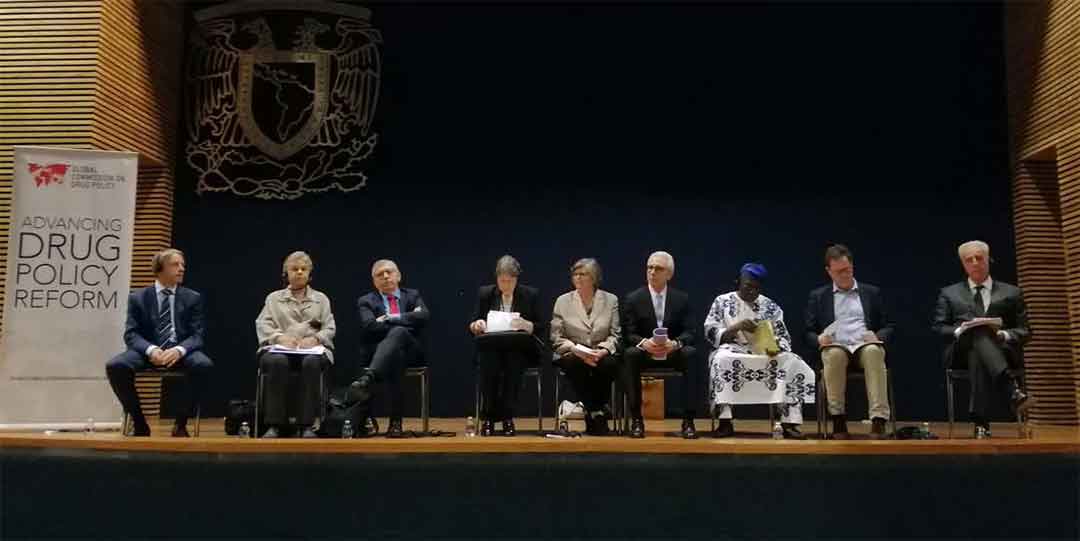The War on Drugs is killing Kiwis - we must choose a different approach


GCDP commissioners - Photo credit: Global Commission on Drug Policy.
We need to find an alternative to the dangerous enforcement tactics of the global response to the drug trade, or people will keep dying, writes Kali Mercier.
New Zealand’s recent deaths from synthetic cannabinoids are deeply tragic and should never have happened. A report released yesterday by the Global Commission on Drug Policy shows how they’re also, sadly, part of a repeated pattern of harm caused by the international illegal drug trade and the international responses to that trade – the so-called ‘war on drugs’.
Taking a world view, free of political agenda, can provide a fresh perspective. This is especially true when it comes to the hot potato issue of drugs. The Global Commission has a stunning cast of esteemed movers and shakers, including twelve former heads of State (one of whom is our own Helen Clark). Their report is unambiguous – rather than continuing with our failed global war on drugs, we need to regulate criminal black markets out of existence.
Whether it was by chance or strategy, Donald Trump called for all countries to sign up to a statement doubling down on enforcement approaches on the day the report was launched. Our prime minister took a principled stand and refused to sign. Instead, she emphasised New Zealand’s commitment to following an evidence-based approach and treating drug use as a health issue.
The Global Commissioners argue that demand for drugs exists, has always existed, and will always exist. If this demand is not satisfied through legal means, it will inevitably be satisfied by the illegal market. They point out that despite the unimaginably huge resources put into enforcement, illegaldrugs are now the world’s largest illegal commodity market, estimated in 2005 to turn over a whopping $320 billion – which would mean they make up nearly 1% of total global trade.
The illegal drugs market is of course completely unregulated, ruthlessly profit-motivated, and unrestrained by the rules and accountability that guide legal economies. Drug producers are incentivised to increase the potency of products to maximise their profit margins, making drug use ever more dangerous. As an example, during alcohol prohibition, consumption patterns moved from beer to the much more harmful moonshine. In the same way, opium use has been supplanted in many countries by heroin use, and now fentanyl. This process is visible in our own country, where early wave synthetic cannabinoids have been replaced by much more dangerous compounds. Sadly, the result has been 40 deaths from synthetics during the past year. This is who the ‘war on drugs’ is killing.
The Commission sets out how the global system is actively undermining the rule of law in developing countries, and hindering economic progress. Illegal drug markets promote money laundering and corruption, violence and instability. Poor communities are caught in the crossfire between the need to scrape out a living and repressive government crackdowns.
One example given in the report comes from an indigenous coca grower in Bolivia. Until Evo Morales came to power, her community faced “extreme violence, murder, the imprisonment of so many young men from our community, and the abuse of women. This was our day to day reality…. The military would come into our homes at any time of night and day. We were constantly being sprayed with gas.” Her family continued to grow coca despite the hardships because they had no other means of subsistence.
The report is careful to emphasise that regulation is not the same as liberalisation. The purpose is not to make drugs more freely available, but rather to minimise the harm that they cause. The commissioners list a range of different possible approaches to regulation. For example, the riskiest drugs could be prescribed by qualified medical professionals to people with drug dependencies. Day clinics in Switzerland that prescribe heroin are a working example of this approach. Other options include pharmacy-only supply, and licenced (but heavily regulated) stores. They emphasise also that any changes should be introduced cautiously and incrementally.
As an example of the success of regulation in reducing health harms, they point to tobacco. Harm from tobacco use, while still huge, has been steadily decreasing in countries such as ours, due to controls on price, packaging, marketing and availability, plus public health education – only possible in a legal market.
What could this mean for New Zealand? Well if we take the cautious approach suggested by the Commission, we would start by regulating cannabis which we have the chance to do in the upcoming referendum. We should also remove criminal penalties for drug use and instead guide people towards health assistance if they need it.
We also want to see a selection of lower harm psychoactive substances regulated for sale, to steer people away from the really bad stuff. We’ve tried this before in New Zealand but for various reasons the legislation ran aground – we should try it again and this time, get it right.
Let’s face it – the Global Commissioners have all been around the block a few times. They’re not afraid to say what needs to be said. We should sit up and listen.
Recent news

Reflections from the 2024 UN Commission on Narcotic Drugs
Executive Director Sarah Helm reflects on this year's global drug conference
What can we learn from Australia’s free naloxone scheme?
As harm reduction advocates in Aotearoa push for better naloxone access, we look for lessons across the ditch.

A new approach to reporting on drug data
We've launched a new tool to help you find the latest drug data and changed how we report throughout the year.

